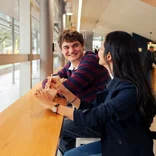Victoria University of Wellington Undergraduate Degrees
- New Zealand
- Wellington
About Program
Victoria University of Wellington offers 18 Bachelor degrees, and with more than 170 subject areas to choose from, you can specialize in what you love. Plus, there is no general degree component, so you can start studying your area of interest from day one.
A degree from Victoria University of Wellington is accredited in New Zealand and widely accepted in the United States*, as New Zealand's universities rank well globally.
There is no better place to shape your future. Start here with a Bachelor of:
-Architecture Studies
-Arts
-Biomedical Science
-Building Science
-Commerce
-Communication
-Design Innovation
-Education (Teaching) Early Childhood
-Engineering (with Honors)
-Environment and Society
-Global Studies
-Health
-Laws
-Midwifery
-Music
-Popular Music
-Psychology
-Science
*Some professional fields (e.g., medicine, law, engineering, teaching) may require additional certifications, licensing exams, or credential evaluations to practice in the US.
Video and Photos
Diversity & Inclusion 💙
BIPOC Support
LGBTQIA+ Support
Accessibility Support
Impact 🌎
Sustainability
We rank #1 in New Zealand for Climate Action and Affordable Clean Energy (THE Impact Rankings). On campus, reusable cups are the norm, and we even have a recycling wall where you can take empty packaging that can be difficult to recycle at home. When you study with us, there are numerous ways you can contribute to our sustainability initiatives, including participating in the University's annual "Growing our Future" tree planting initiative to help restore native forests around the Wellington region.
Program Highlights
- School of Business and Government holds the "Triple Crown" of accreditations (AACSB, EQUIS and AMBA).
- Bachelor in Engineering (Hons) is Washington Accord accredited through Engineering New Zealand
- Our university is a fully accredited participant of various US funding programs that allow US students to finance their degree with us.
- Most non-professional bachelor degrees take three years to complete.
- Engage in student life with over 140 clubs and societies.
Popular Programs

As a Bachelor of Science student at Victoria University of Wellington, you’ll absorb knowledge, observe phenomena, experiment with ideas, and maybe even be part of making new discoveries.
With a strong practical focus, a Bachelor of Science will take you beyond the lecture theatre with hands-on laboratories, field trips, and summer scholarship opportunities.

Victoria University of Wellington's Bachelor of Arts allows you to explore your passions through a rich variety of subjects and develop the creativity and flexibility needed in a changing job market. The Bachelor of Arts at Victoria University is ranked in the top 1 percent worldwide for Arts and Humanities (2024 QS World University Rankings) and is New Zealand's most flexible Bachelor of Arts.

Kickstart your career by gaining skills that are in demand in top companies and the public sector. The Bachelor of Commerce is your pathway to a successful career in the worlds of business, finance, and government.
Victoria University's Wellington School of Business and Government holds the ‘Triple Crown’ of international business education accreditations. By studying here, you can be confident your qualification will be recognized globally for its quality.

If you love good design—whether it be of objects, computer graphics, systems, or experiences—and want to learn from a leading-edge university, then this is the right degree for you.
While developing the skills and knowledge that industry currently demands, you'll also be pushing the limits and forging the future of design practice.

Study Psychology to understand behavior—how we think, feel, and act—and how those processes can go wrong. Learn how our biology and our environment interact to make us who we are.
We are the only university in the country offering a specialized Bachelor of Psychology. In this unique degree, you study a required major and you have the option of adding a complementary major in a specialized area—this means you can tailor the degree to suit your interests and career goals.






















Response from Victoria University of Wellington
Kia ora Starr, and thank you for your thorough review. We are sorry to hear you haven’t been having a 5-star experience at our university and appreciate your honesty and openness.
You’re right that the cost of living is high; it’s a small country not close to many other places, which means that lots of our day-to-day items come from overseas and come with a higher price tag. Lots of non-locals, and locals too, acknowledge the same but also say that the safety the country and the natural beauty help balance things out.
Our university prides itself on its teaching and research and we are sorry to hear that your program hasn’t met your expectations. We appreciate you identifying which program you are studying with as we were able to share this review with the Faculty of Health. Regarding your comments about our curriculum's focus on Māori worldviews, we appreciate your perspective. Te Herenga Waka—Victoria University is committed to honoring the principles of Te Tiriti o Waitangi and embedding Indigenous knowledge in our education. While you've noted concerns about its applicability internationally, we believe Māori perspectives offer valuable insights into how Indigenous wisdom and cultural understanding can enhance any health practice globally. The skills of cultural competency and understanding different worldviews are increasingly valued in international settings. However, we understand your desire for more content aligned with your future plans and would welcome the opportunity to discuss how we might better balance these educational priorities in your program. The Head of the School of Health would be happy to meet with you to discuss your specific experience.
Though you haven’t connected with any kiwis (locals), we’re glad to hear that you’ve found some meaningful relationships within our international community. Despite all the downs in your overall study experience thus far, we’re glad you will be continuing your studies with us and suggest you get in touch with our International Student Experience team for anything you think they could help with, so that the rest of your study experience can hopefully have more ups than downs.